AMD FX-8320E CPU Review: The Other 95W Vishera
by Ian Cutress on January 13, 2015 10:00 AM ESTCPU Benchmarks
The dynamics of CPU Turbo modes, both Intel and AMD, can cause concern during environments with a variable threaded workload. There is also an added issue of the motherboard remaining consistent, depending on how the motherboard manufacturer wants to add in their own boosting technologies over the ones that Intel would prefer they used. In order to remain consistent, we implement an OS-level unique high performance mode on all the CPUs we test which should override any motherboard manufacturer performance mode.
HandBrake v0.9.9: link
For HandBrake, we take two videos (a 2h20 640x266 DVD rip and a 10min double UHD 3840x4320 animation short) and convert them to x264 format in an MP4 container. Results are given in terms of the frames per second processed, and HandBrake uses as many threads as possible.
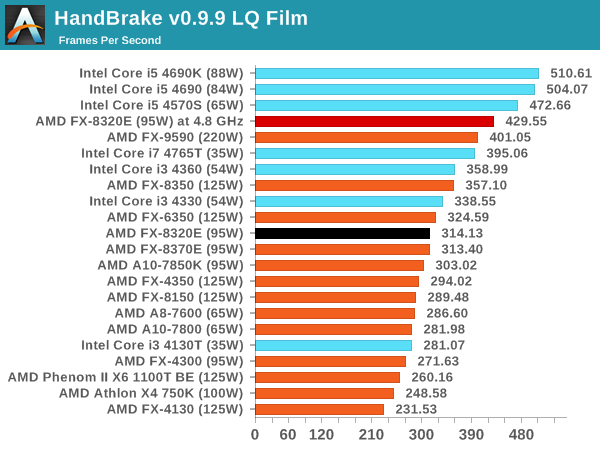
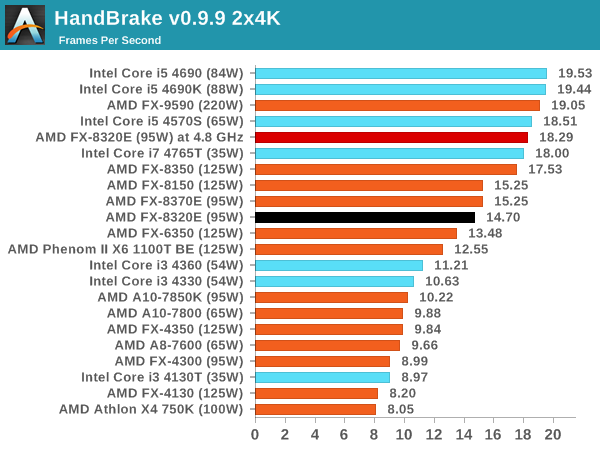
For Low Quality conversion, the 8320E has trouble keeping up with the full-fat i3, but beats them by a good margin when the frame sizes open up.
Dolphin Benchmark: link
Many emulators are often bound by single thread CPU performance, and general reports tended to suggest that Haswell provided a significant boost to emulator performance. This benchmark runs a Wii program that raytraces a complex 3D scene inside the Dolphin Wii emulator. Performance on this benchmark is a good proxy of the speed of Dolphin CPU emulation, which is an intensive single core task using most aspects of a CPU. Results are given in minutes, where the Wii itself scores 17.53 minutes.
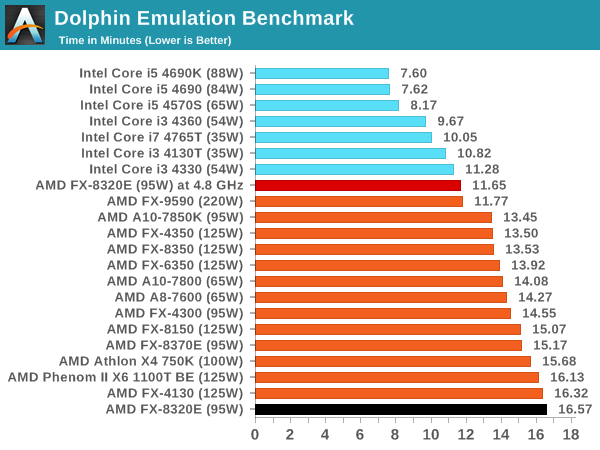
Dolphin historically prefers high IPC single core performance, which the 8320E is lacking.
WinRAR 5.0.1: link
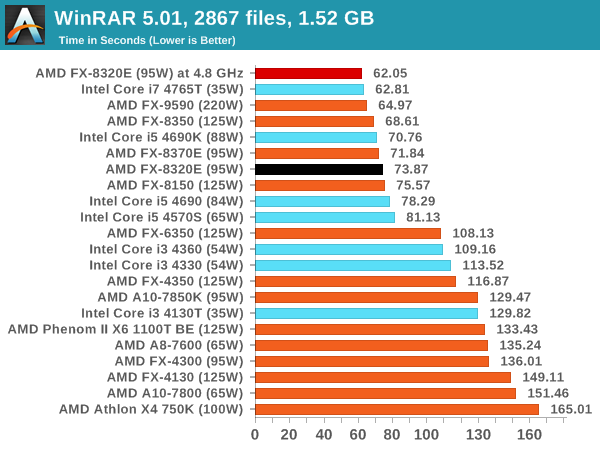
The eight threads of the FX-8000 series show through here, beating all the i3 and some of our i5 parts.
PCMark8 v2 OpenCL
A new addition to our CPU testing suite is PCMark8 v2, where we test the Work 2.0 suite in OpenCL mode.
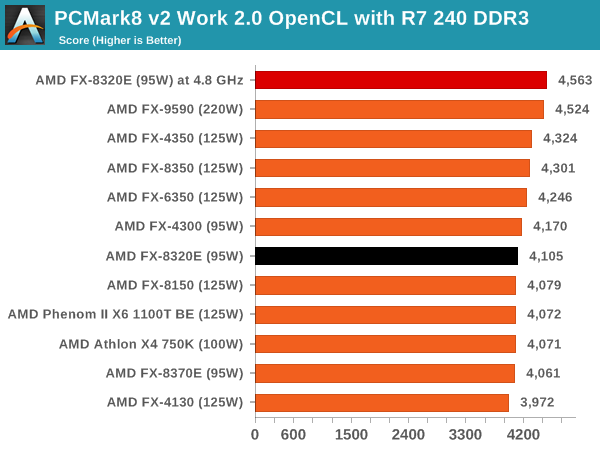
Hybrid x265
Hybrid is a new benchmark, where we take a 4K 1500 frame video and convert it into an x265 format without audio. Results are given in frames per second.
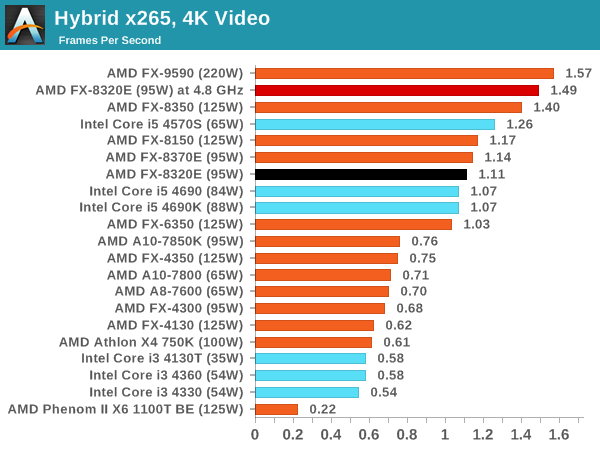
For x265 conversion those extra threads end up highly beneficial for the FX-8320E, nudging inbetween our i5 data.
3D Particle Movement
3DPM is a self-penned benchmark, taking basic 3D movement algorithms used in Brownian Motion simulations and testing them for speed. High floating point performance, MHz and IPC wins in the single thread version, whereas the multithread version has to handle the threads and loves more cores. For a brief explanation of the platform agnostic coding behind this benchmark, see my forum post here.
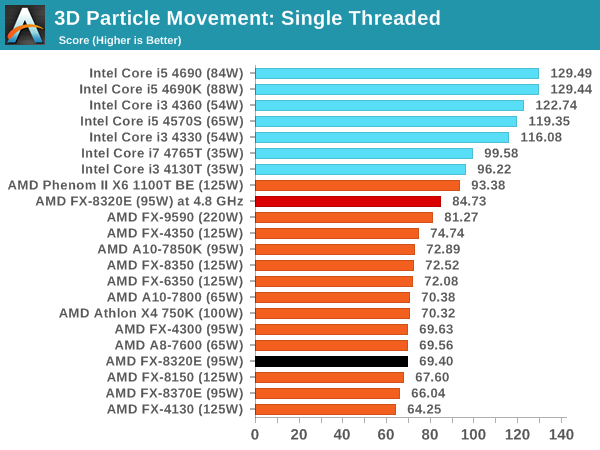
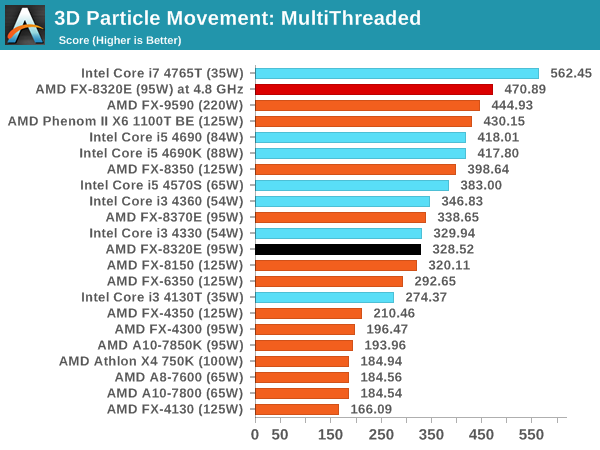
While single thread performance is behind, the overclocked FX-8320E storms ahead of our FX-9590 results.
FastStone Image Viewer 4.9
FastStone is the program I use to perform quick or bulk actions on images, such as resizing, adjusting for color and cropping. In our test we take a series of 170 images in various sizes and formats and convert them all into 640x480 .gif files, maintaining the aspect ratio. FastStone does not use multithreading for this test, and results are given in seconds.
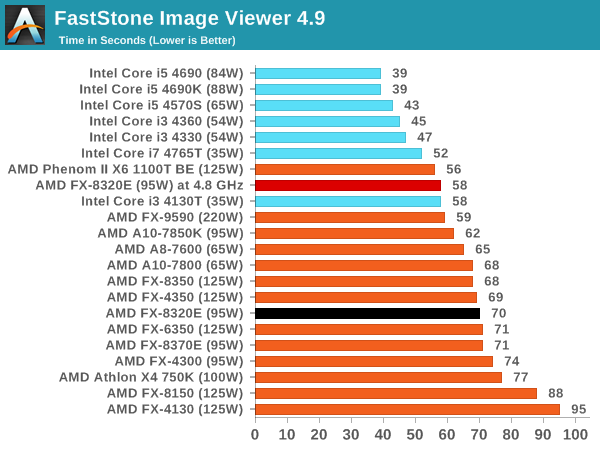
Web Benchmarks
On the lower end processors, general usability is a big factor of experience, especially as we move into the HTML5 era of web browsing. For our web benchmarks, we take four well known tests with Chrome 35 as a consistent browser.
Sunspider 1.0.2
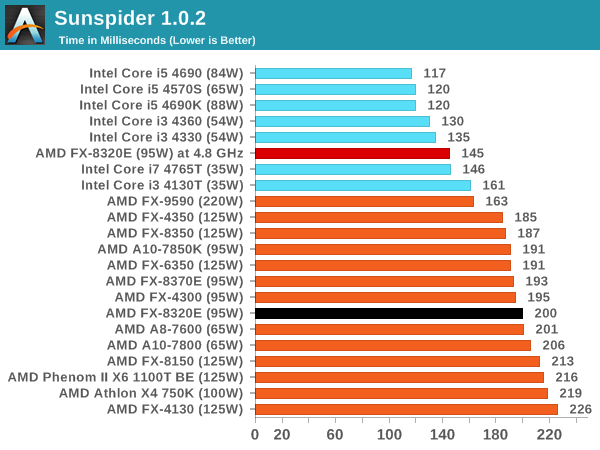
Mozilla Kraken 1.1
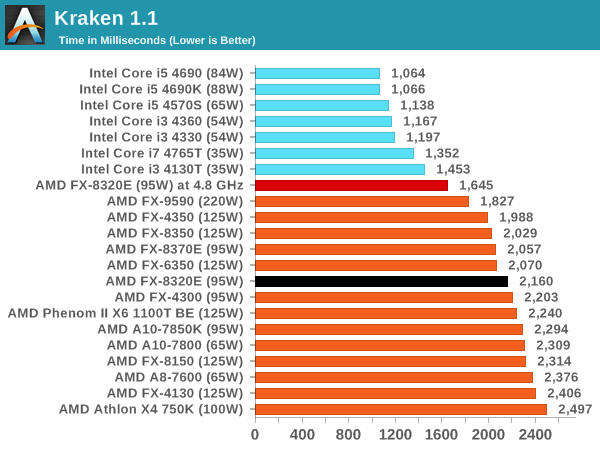
WebXPRT
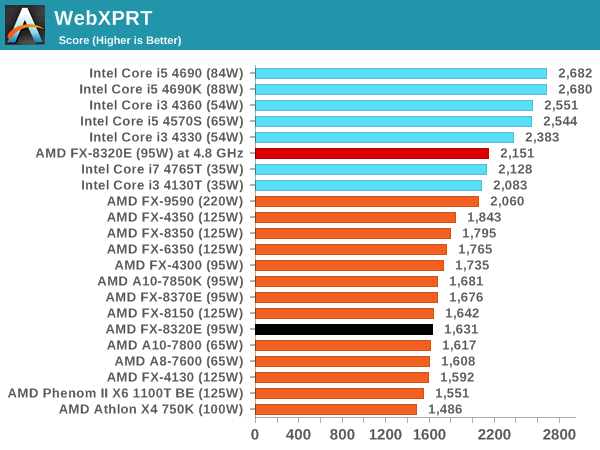
Google Octane v2
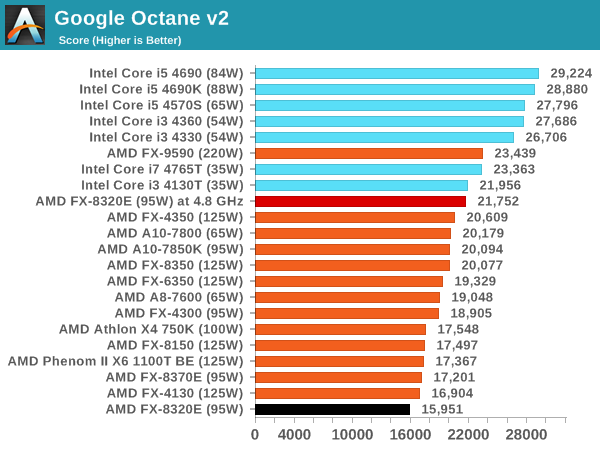










92 Comments
View All Comments
jabber - Friday, January 16, 2015 - link
And with the labour charges etc. all included you could well have just bought a job lot of new Dell Dimensions.Plus decent AM3 chips are tres expensive now.
phoenix_rizzen - Friday, January 16, 2015 - link
Actually, our hardware costs are decreasing slightly each year while the hardware it buys is increasing. Our current desktops are around $150 CDN including motherboard with Radeon graphics onboard, Athlon-II x4 CPU, 2 GB of RAM. We run diskless Linux, so no harddrive, no floppy drive, no optical drive; the only moving parts are the CPU, PSU, and case fans (and sometimes we even remove the case fan).Our original build with nVidia 6100 graphics onboard, 512 MB of RAM, and a Sempron CPU was over $200 CDN 7-odd years ago.
Buying the CPUs in bulk for upgrades was less than half the cost of a new system. Buying RAM upgrades was much less than half the cost of a new system. And a single tech working for a full day could upgrade an entire lab of 30 stations with some time to spare for testing ... for less than the cost of a single new system.
We've been doing this for just over 12 years now. We know which is less expensive for us, and it's not buying name brand computers with Intel CPUs and chipsets. Everytime we put a bid out for systems, the Intel systems are more expensive without being a whole lot more powerful, and they require discrete GPUs, whereas the AMD systems include graphics support on the motherboard (Intel 3D has improved over the years, but still doesn't hold a candle to nVidia or AMD).
ddriver - Wednesday, January 14, 2015 - link
Why would you go for an AMD build? I am not a big fan of Intel's past practices, and as much as I sympathize with AMD their products are simply way too weak, their performance per watt ratio is so low the lower hardware price doesn't really matter, you still end up paying more for it when you account for the electricity bills.Besides, for an office machine, a 5W ARM board costing 35$ suffices.
The only reason I can think of buying AMD is in case you want to burn some money to keep AMD afloat for the sake of not leaving intel without competition, not that AMD is much of a competitor anyway... More like a perpetually crippled "competitor" existing solely for the purpose of not running unopposed.
phoenix_rizzen - Thursday, January 15, 2015 - link
See my post just above yours (posted after yours in time).ddriver - Saturday, January 17, 2015 - link
So the people who benefit from AMD are those who don't have enough money, so they can end up spending more for less over time? Doesn't sound like a good deal...phoenix_rizzen - Monday, January 19, 2015 - link
And I guess black is white and down is up in your world?Jinx50 - Sunday, January 25, 2015 - link
Ironically in contrast to all the misinformation spewed "above and below" I still play Crysis 3 on ultra with a overclocked 1090T @ 3.8GHz and a HD 6970.I'm still waiting for the unplayable game to arrive "to give me a reason to upgrade" meanwhile I have to ask, how many Intel chips and boards have you all burned cash on in the last 5 years?
I'm not hating on Intel just stating facts "in my instance in regards of the bang for the buck factor", and I will probably snag an FX 8xxxx when this rig finally hits the medium settings wall.
AMD is not a processor for those who don't have the money "on the contrary". It's the processor for those who want to KEEP THEIR MONEY. ROFL I could dump money on an Intel but do I want to ride that roller coaster NOPE..
Oxford Guy - Thursday, April 2, 2015 - link
The minimum frame rates in that Bioshock Infinite chart are worrisome.stefstef - Wednesday, January 21, 2015 - link
nope. intel just has the better processor portfolio. this is not because amd cpus are so bad, but intel has the advantage of a much lower production process (22nm instead of 32nm). they are technically ahead in every sector: design, process and manufacturing. nonetheless amd makes sense as intel charges for the premium quite some good money. the usual jobs might be done by a amd as well as an intel.TheinsanegamerN - Wednesday, January 14, 2015 - link
I wouldnt go so far as to say that AMD wont give you a good experience. I traded, on a bet, my motherboard and cpu with my other pc gaming friend, and went from an i5 3570k to aq fx 6300. know how much of a difference there is? nothing. both get 60fps in everything at 1200p with my 770. i will say, if i have multiple game servers running in the background, the fx does not slow down nearly as much as the i5 ever did, even though hypothetically the i5 was more powerful, it couldnt multitask as well.and with the new consoles both coming with 8 core cpus, i think AMD chips will still work well, at least for the forseeable future.